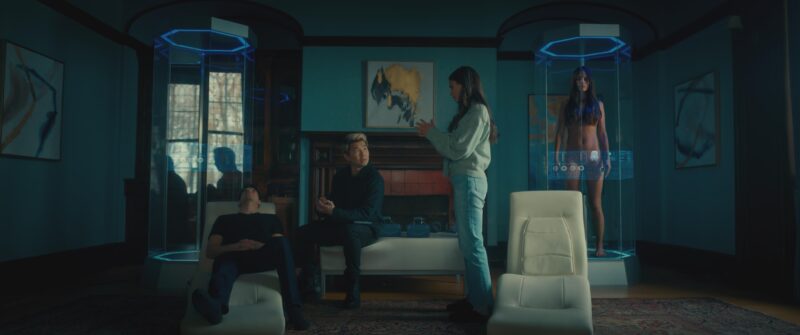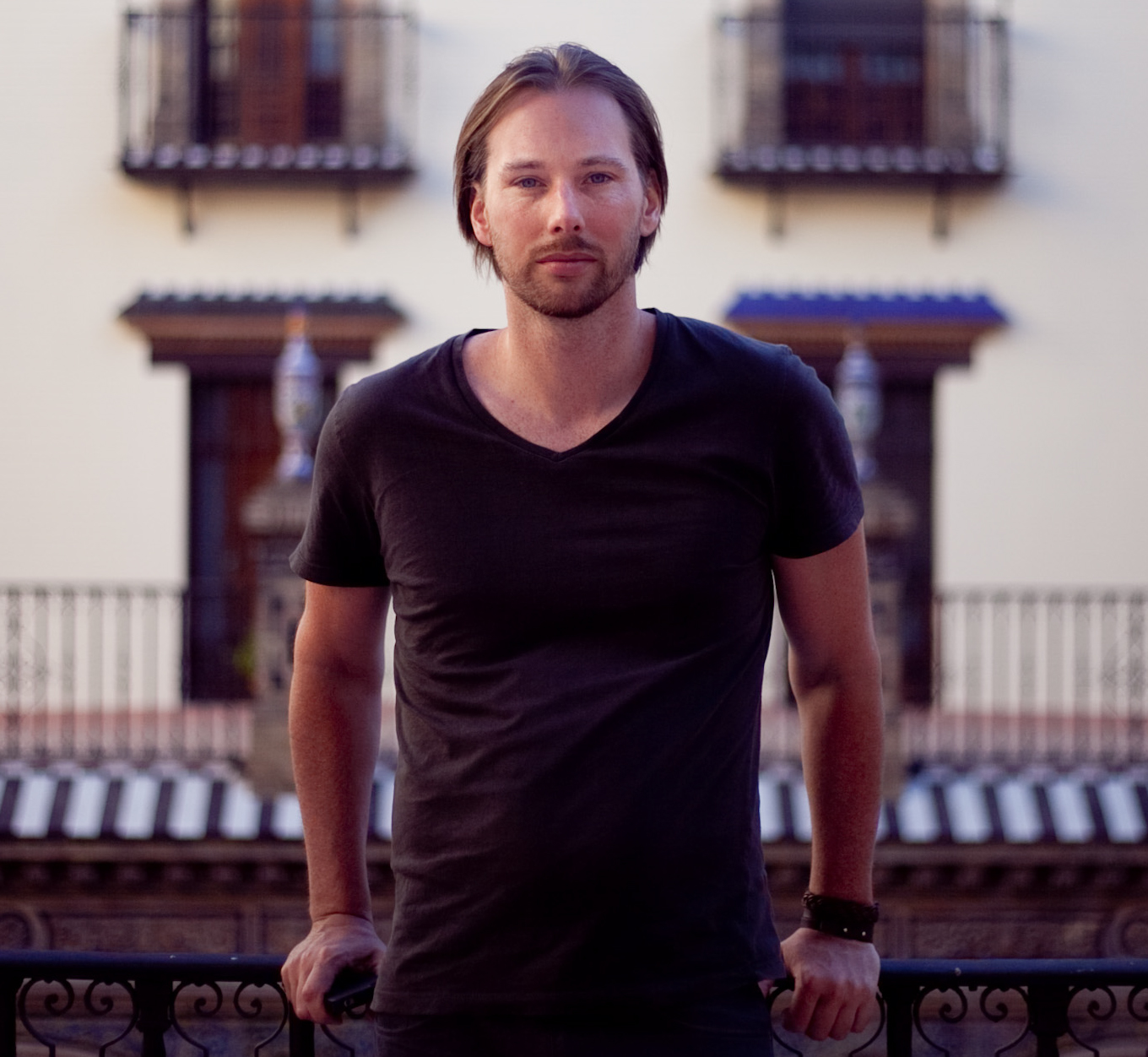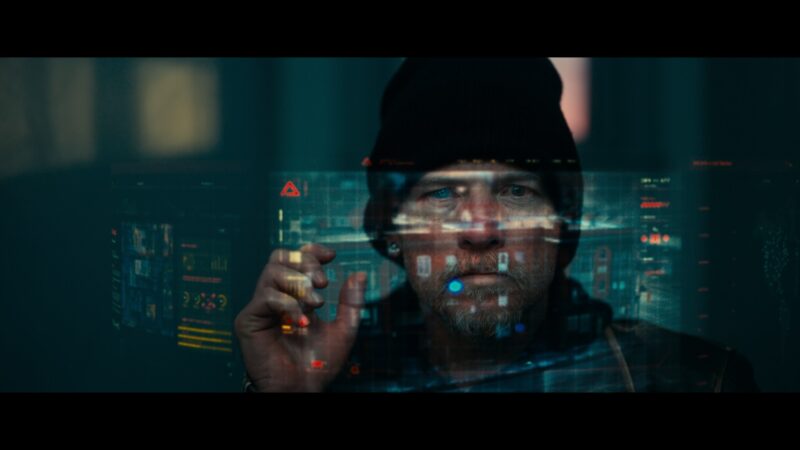Interview with screenwriter & Dawson grad Ryan Christopher Churchill
Ryan Christopher Churchill (Creative Arts, 1999) is the screenwriter of Simulant, a science fiction thriller that will be released in Canada on April 7.
Simulant tells the story of a humanoid A.I.’s attempt to win over a widow’s heart, which places it in the path of a government agent trying to stop the rise of machine consciousness. The film stars some of the most popular actors right now: Simu Liu, Sam Worthington, Jordana Brewster and Robbie Amell. The trailer can be viewed here.

Ryan shared his path toward his dream job, some Dawson memories and more in an interview with Dawson’s Communications Office.
1. Tell me about your career as a screenwriter. How did you get into this line of work?
I’ve had a deep love for film since I was young. My father took me to see a double feature of Star Wars and Empire Strikes Back at the cinema when I was eight and ever since then, I’ve imagined myself in the movies in some way. I started as an actor but found I had my own stories that I wanted to tell so I taught myself screenwriting and then went on to study film production. I submitted the first feature length script I ever wrote, entitled Purity, to the Nicholl Fellowship in Screenwriting and it actually placed in the quarter finals. That gained me a lot of contacts and almost a sale, and I just kept building from there until I finally sold Hello Stranger (now Simulant) in 2018.
2. What was your educational background and career path? Did your Dawson years influence or inspire you?
I studied theatre and film at Toronto Metropolitan University, graduating with a Bachelor of Fine Arts and a certificate in Film Studies. I was always worried about being able to support myself and quite enjoyed physics and math so I studied Mechanical Engineering Technology at Dawson. During that time, I took an acting class with the legendary Fred Ward who became a real mentor and friend to me. Fred really opened me to a world of art that until that point I hadn’t been exposed to. He gave me a respect for the craft of acting, writing, and overall creation of art that strengthened my determination to pursue a path in the arts and helped me believe in myself. He passed in 2017 but I am sure I am not the only life he greatly influenced coming out of Dawson.
3. Tell me about your experience at Dawson? What are your best memories? What did you enjoy most?
I remember spending countless hours in study rooms preparing for math and physics exams. One of my friends and study partners, Joseph Eniojukan, actually advised me for parts of Simulant. I remember getting a 98% (99% maybe?) in Calculus 1. I had 100% until I made 1 error on the final! I remember being not very good at operating a lathe in my machine shop class and donning a welding suit and doing a presentation as Magnesium Man in my Metallurgy class. That was probably a sign that my heart was elsewhere. The most memorable time though was when I went to drop Fred Ward’s acting class because I was doing some classes outside of Dawson that conflicted. The academic counselor informed me at the time that if I dropped Fred’s class, I would become a part-time student and suggested I go speak with Fred to see if another arrangement could be made. I followed the advice and upon meeting with Fred, he proposed we meet one-on-one once a week for an hour and he would assign work that, if I completed and passed, I would fulfill the requirements of the course. I accepted and a friendship was born that gave shape to the rest of my life.
4. How have you been able to pursue this kind of dream job? Do you have advice for others?
Two words: drive and perseverance. Talent can get you a certain distance, but it takes discipline to face the blank page day in and day out and get to the finish line. I know talented people that gave up because it was too difficult. I know people that I never thought would go anywhere succeed beyond what any of their peers imagined. The one constant for those that find success is they never give up. My advice would be to master your craft. Learn the rules so you can understand how to break them. Don’t get caught up in revisions and rewrites until you get to the end. You’ve heard “write what you know” but if you find that limiting, I would tell you to expand what you know, and simply be sure you write from the heart. Finally, treat it like a job and find a routine that involves writing almost every day. If you wait for inspiration to strike every time, it will be hard to complete anything.
5. Tell me about this major motion picture Simulant. What was your inspiration? What were your influences?
The initial spark was from experiencing a sort of rejection, where a relationship came to an ending, and it felt like the other person was able to switch off their love. It led me to thinking about the nature of love in general. How some people are in love with a person who doesn’t treat them well and everyone else knows they are wrong for them, but they can’t seem to let go. Or how in other scenarios, you can see two people that are made for each other, but for one reason or another, they can’t make it work. Like some of us are programmed to love a certain person. I combined that with a deep interest in the possibilities of Artificial Intelligence and all the impacts it will have for our collective future. Metropolis, both the 1927 Fritz Lang film and the 2001 anime directed by Rintaro and based on Osamu Tezuka’s 1949 manga, were big influences. I also drew from Yasuhiro Yoshiura’s anime Time of Eve and parts of Steven Spielberg’s film AI, particularly the relationship between humanoid robot child character and grieving mother. Superintelligence: Paths, Dangers, Strategies by Nick Bostrom also aided when I was in the development stage of production.
6. How long did it take you to write it? Did you shop your script to a production company or did you get hired to write a script?
I wrote the first draft on spec in 2015. It took me about 2-3 weeks, which is the fastest I have ever written a script. I shopped it around a bit. Though it generated interest, the extremely excellent Ex Machina was coming out at that time and I got a lot of “it’s too much like Ex Machina.”I put it in the virtual filing cabinet and thought maybe I’d have a chance to get it made when I sold something else. Instead, a few years later, I sent it to director April Mullen. She took a shine to it and eventually got in touch to tell me she’d like to make it her next film. The rest is history I guess!
7. What messages are you trying to convey to the audience (without giving away spoilers)? What are your hopes for the film?
My main hope is that the audience is entertained and surprised by the film. Ideally, they will come away thinking about what defines our humanity. Is it a soul? Is it Descartes’ “I think therefore I am?” Is it something else? I also hope to contribute to the exploration of the ethical quandaries surrounding technological and scientific advances. Just because we can achieve something, should we? This is an age-old question that is very pertinent right now with AI and genetic engineering, but it was also the questions scientists asked themselves when splitting the atom that led to the nuclear bomb.




